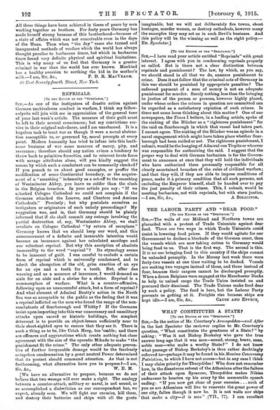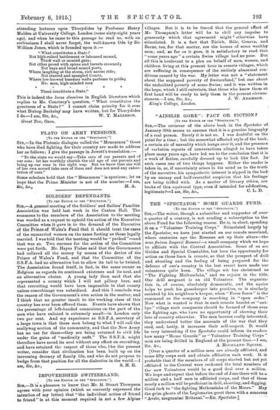WHAT CONSTITUTES A STATE?
[To me Ernes or me "Brecreme.n SIR,—In the notice of Mr. Courtney's Armageddon—and After in the last Spectator the reviewer replies to Mr. Courtney's question, "What constitutes the greatness of a State?" by asking "Was it not Bishop Berkeley who gave the true answer long ago that it was men—sound, strong, brave, sane, noble men—who make a worthy State P" I do not know what passage of Bishop Berkeley's is thus rather doubtingly referred to—perhaps it may be found in his .Maxims Concerning Patriotism., to which I have not access—but in any case I think I may claim priority for Thncydides ! Who does not remember how, in the disastrous retreat of the Athenians after the failure of their admit upon Syracuse, Thucydides makes Nikiaa endeavour to hearten up his army by the memorable speech ending : "If you now get clear of year enemies ... such of you as are Athenians will live to renovate the great power of our city, fallen though it now be. It is not walls nor ships that make a city—it it men".(VII., 77). I can recollect
attending lectures upon' Thucydides by Professor Henry Malden at University College, London (some sixty-eight years ago), and when he came to this passage he read us, with an enthusiasm I shall never forget, the well-known Ode by Sir William Jones, which is founded upon it:- " What constitutes a State ?
Not high-rased battlement or laboured mound, Thick wall or moated gate; Not cities proud with spires and turrets crowned; Not bays and broad armed ports, Where laughing at the storm, rich navies ride; Not starred and spangled Courts, Where low-brewed baseness wafts perfume to pride; No: men, high-minded men • • TheseConstitute a State."
This is indeed the locus elossicus in English literature which replies to Mr. Courtney's question, " What constitutes the greatness of a State?"- I cannot claim priority for it over what Bishop Berkeley may have written, but for Thucydides







































 Previous page
Previous page